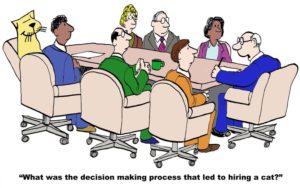Meetings are expensive. Take a moment and add up the collective costs of all of the salaries of the people in the room. That said, not meeting can be exponentially more expensive for missed opportunities, poor coordination, or risks not being exposed. Most leaders have had more education on how to speak and make presentations than on listening. What a waste, if a room full of people are great speakers but only mediocre listeners.

Consider how expensive it is to bring a group of experts into a room to vet an opportunity. The collective hourly rate is significant, and we would listen with greater care if there was a meter running. That said, meetings take time; everything else takes longer.
Listening effectively is…
- Strategic. The more someone listens, the more they are able to perceive what motivates others, what priorities exist, and what opportunities or issues are ahead.
- Validating to the speaker — perhaps the most validating thing for another that a leader can do. To be heard is something that delights everyone and improves self-esteem. Great listening goes beyond understanding the opportunity: it is understanding the person.
- Learning, and continuous learning is a responsibility of anyone in a leadership role.
Unfortunately, most people organize around what they want to say versus how they intend to listen. Listening goes well beyond the skill of retaining information. It involves discernment and critical thinking of the ideas being presented and the ability to link proposals into a larger context. In addition to the cognitive side of listening to the ideas, there is the more subtle, and less trained, ability to listen to the person. This is a deep listening that includes appreciating what really sparks the speaker, what moods do they have about the initiative, where are they inclusive or where are they defensive, and how they connect to the people in the room. Experts listeners discern all of this and hear the content.
The preeminent listeners embody listening. It is a core organizing principal in their leadership, and they develop the dual skills of listening to understand and listening at rest. The most effective leaders do not switch from listening to speaker and back to listening; they are listening and observing all of the time.
Click here to download the pdf: Leadership Listening

